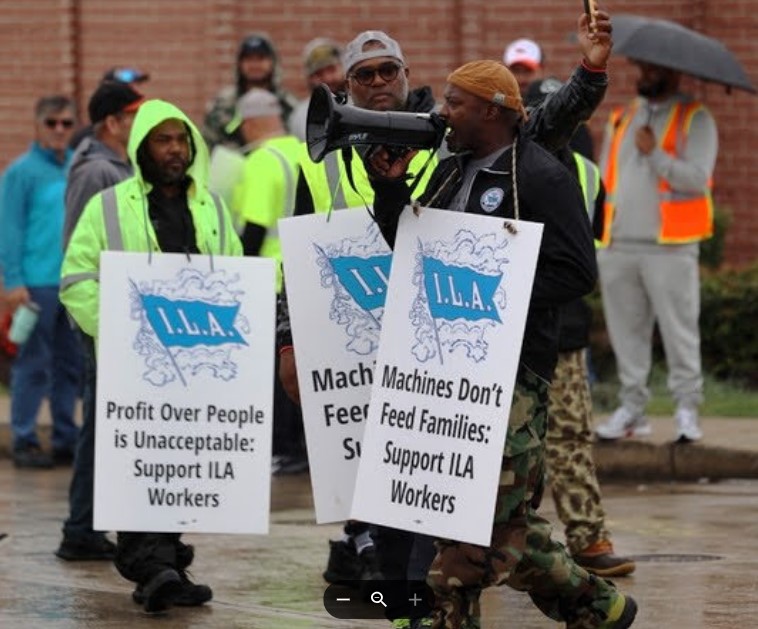
By Aria Brent
AFRO Staff Writer
abrent@afro.com
And
By Tashi McQueen
AFRO Staff Writer
tmcqueen@afro.com
Dockworkers and longshoremen of Baltimore have joined a strike taking place along the East and Gulf coasts. Protesters could be seen picketing and stopping car shipments from entering at the Port of Baltimore shortly after midnight on Oct. 1, when the union contract with the International Longshoremen Association (ILA) and United States Maritime Alliance (USMX) expired. Thousands of members of the ILA are protesting for a 77 percent pay increase over the next six years and job security as the use of automation is on the rise.
The ILA put out a statement the day the protest began, addressing the USMX and laying out why the two organizations couldn’t negotiate a new contract.
“Many of our members are operating multi-million-dollar container-handling equipment for a mere $20 an hour. In some states, the minimum wage is already $15,” the statement read. “Furthermore, our members endure a grueling six-year wage progression before they can even reach the top wage tier, regardless of how many hours they work or the effort they put in.”
While the effects of the strike are expected to be felt nationwide, the work stoppage is sure to have a deeper impact for the Port of Baltimore, which already experienced a lengthy closure in 2024 due to the collapse of the Francis Scott Key Bridge on March 26. Maryland Gov. Wes Moore (D) announced the full reopening of the Port of Baltimore only months ago, on June 12.
As a result of the strike, consumers could face a lack of products on the shelves or higher prices. Using data from Oxford Economics, JPMorgan Chase reports that an estimated $4.5 billion to $7.5 billion could be lost per week.
Tinglong Dai, the Bernard T. Ferrari professor of business at John Hopkins Carey Business School, discussed what he believes the overall impact of the strike on businesses will be in the region.

“Costs for operations will be higher, which will cause more of a problem for small businesses. But products should be able to make it in time for the holidays,” he said. “Assuming that the strike does not last through November, there should be no big loss of items.”
Charm City’s dock workers and longshoremen play an integral role in both the local and national economy. Moore spoke on the matter after an Oct.1 press conference, sharing that he supports the workers.
“We continue to not just monitor the situation and negotiations, but we also stand with our workers. We had a massive and deadly tragedy that took place six months ago with the collapse of the Key Bridge and every single day we were standing with our ILA members,” he said.
“These are incredibly important parts of our community and society. We hope that these negotiations move quickly because we both need to make sure that our workers are taken care of and also make sure that we can keep American commerce going because our ports are crucially important to the greater American economy,” continued Moore.
Maryland’s Democratic nominee for the U.S. Senate, Angela Alsobrooks shared a statement expressing her support of ILA members as well.
“The longshoremen and our dockworkers at the Port of Baltimore are essential workers who deserve a fair deal. I strongly urge the USMX to come to the table and negotiate a deal that respects the incredible contributions that these workers have on Maryland families, our community, and our economy,” she said.
On the condition of anonymity, the AFRO spoke with port workers in the Baltimore area about their thoughts on the strike and how it could impact them as consumers. Per union rules, members of the ILA could not identify themselves in photos or make comments in the media about the strike.
“People are rebelling and protesting for various reasons,” said a Baltimore woman on Oct. 2. “At the end of the day, it’s greed.”
Another Baltimorean told the AFRO that port operators should “pay the people their money,” and “pay them what they deserve.”

Though the strike has been mostly peaceful across the nation, in Baltimore, violence broke out on night one.
“Around 4 a.m., officers responded to an incident involving a driver and striking workers outside of the Dundalk Marine Terminal,” said an MDTA spokesperson. “The incident remains under investigation.”
MDTA said police have not yet made any arrests in connection with the strike at the Port of Baltimore.
Support for the strike flooded the internet nationwide as both ILA members and those closest to them made posts expressing their frustrations, concerns and demands from these workers and contracts.
“No Justice, no sleep! As a dues-paying Member of #ILA I am a proponent of #WorkersRights, not Corporate greed,” said Lashonda “L.J.” Holloway, of Jacksonville, Fla on Facebook. “People feed families, not robots! Profit over people is unacceptable! We are fighting for #FAIRwages and against the encroachment of automation!”
Calls for understanding what ILA members are fighting for came from the family members of longshoremen, explaining that this strike is long overdue.
“For those of you who don’t know– I am the granddaughter of a longshoreman. I am the cousin of a longshoreman. We must protect and support our hardworking families and friends who work hard 24/7 to give us what we need,” said Maria Venuto Bulone, of Brooklyn, N.Y. on Facebook. “Let’s stand by them all, let’s support them.”
As the strike continues, the ILA has been insistent that they will stand firmly in their fight for justice and better work conditions.
“Our position is firm: we believe in the value our incredible rank-and-file members bring to this industry and to our great nation. They deserve a contract that recognizes their contributions, secures their jobs, and reflects the profits generated by their labor.”
The post United they stand: Dock workers and longshoremen in Baltimore join national strike for better wages and job security appeared first on AFRO American Newspapers.











